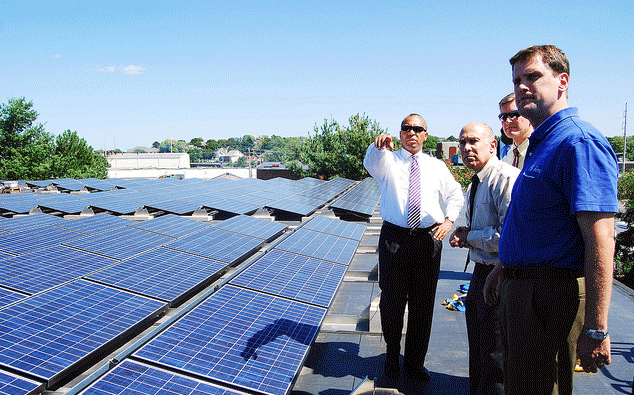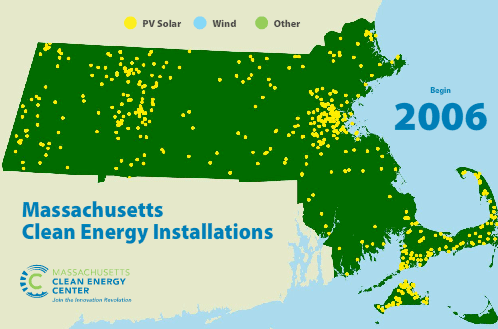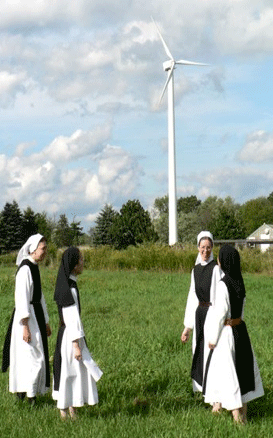Green Energy Jobs Growing
Air Date: Week of September 14, 2012

Massachusetts Governor Deval Patrick tours a solar panel installation. (Office of Governor Patrick)
President Obama’s call for creating new jobs through renewable energy development is a reality in Massachusetts. Alicia Barton McDevitt, the CEO of the Massachusetts Clean Energy Center, tells host Steve Curwood that the number of green energy jobs in the Bay State has grown by more than 11 percent.
Transcript
CURWOOD: Trains may be one way to reduce the use of fossil fuels - renewable energy is another.
OBAMA: We have doubled our use of renewable energy, and thousands of Americans have jobs today building wind turbines and long-lasting batteries.
CURWOOD: President Obama might have had Massachusetts in mind - it's leading the pack in generating green jobs. A recent Industry Report on the sector lays out precisely how the Bay State has achieved double digit growth, and joining me now is Alicia Barton McDevitt, the CEO of the Massachusetts Clean Energy Center, Welcome!
BARTON MCDEVITT: Thank you for having me!
CURWOOD: Now, an 11 percent job growth rate is phenomenal. I mean, even China doesn’t have that kind of growth rate in it’s over all economy. And in this country right now, where it’s more like one percent job growth…how has Massachusetts been able to do this?
BARTON MCDEVITT: Well, it is phenomenal. And it is because we have come together through the state government, working with business partners, working with academic institutions, working with environmental advocates… to develop programs and policies that work that make business predictable; that allow businesses to grow and get a foothold in the market and then expand here in Massachusetts.
CURWOOD: What do these companies look like? I imagine they’re mostly small.
BARTON MCDEVITT: They are! The vast majority of the 5,000 firms that are participating in the clean energy economy here in Massachusetts are small businesses with less than 10 employees. We are growing these businesses from the ground up - from small operations and startups to hopefully larger companies that generate additional jobs as they grow.
CURWOOD: Tell me, what is a clean energy job?
BARTON MCDEVITT: A clean energy job can be a lot of different things. There are a variety of different technologies that fall under the rubric of clean energy. That would of course include things like wind and solar and those types of clean energies.
The largest sector of clean energy jobs, actually, in Massachusetts is around clean energy measures around the energy efficiencies measures that are installed in homes and businesses, and even in school buildings across the Commonwealth.

Massachusetts solar installations are represented in yellow on this map. (Massachusetts Clean Energy Center)
In terms of the types of jobs that are available, some of those are around installation and maintenance, which is the largest number of jobs by sector. There are sales and distribution jobs associated with that; engineering and research, manufacturing and assembly, which I should point out grew 36.6 percent from 2011-2012, which is a significant jump for that sector of the economy.
CURWOOD: Wait a second, you’re saying that manufacturing growth in the clean energy sector grew by 36 percent?
BARTON MCDEVITT: That’s correct. We saw a significant increase in manufacturing and assembly jobs, and that is something that we’re very proud of, particularly at a time when the traditional economic trends are trending the other way. But that’s because we’ve helped companies grow and locate here and including keep their manufacturing operations here.
CURWOOD: How did the federal stimulus program affect the growth of clean energy jobs in Massachusetts?
BARTON MCDEVITT: Well, there was a huge infusion of investment dollars that came as a result of the federal stimulus act. There were many dollars put in place to directly incentivize, for example, renewable energies and energy efficiencies at municipal buildings - for example, local wastewater and drinking water treatment plants.
There were dollars made available to facilitate rebates for individual homeowners. And all of those dollars that flowed through the federal Department of Energy and all of those other agencies, definitely put a spark behind some of this expansion and adoption of technologies that we have seen.
CURWOOD: So how has all of this development of clean energy jobs in Massachusetts, affected the Massachusetts’s carbon footprint?
BARTON MCDEVITT: Well, we have seen greenhouse gas emissions go down over time in Massachusetts - part of that is related to larger global factors like the slow-down in the economy. Or, natural gas replacing coal for some of our power generation. But that’s only part of it.
We have also seen a significant expansion in energy efficiency measures and installed renewable energy that have significantly driven down emissions. So, for example, Massachusetts this year was ranked number one in the country by the American Council for an Energy Efficient Economy. That’s the first time that Massachusetts has claimed that top spot from California, so we’re very proud of that. We’ve also seen solar grow a tremendous amount in recent years - to over 146 megawatts of installed capacity in the state.
CURWOOD: So what are the dark spots on this bright horizon?
BARTON MCDEVITT: Well, some of the challenges facing the clean energy industry right now involve uncertainties either in the marketplace or the landscape for incentives. So, for example, at the federal level there are certain tax incentives, like the production credit, that are available to wind developers whose future is uncertain and could be dependant upon the outcome of the election.

Mount Saint Mary’s Abbey in Waltham, MA invested in a windmill to power their abbey. (Massachusetts Clean Energy Center)
For example, Mitt Romney has said that he opposes that production tax credit. That makes it difficult for businesses that are trying to expand and plan to know what incentives will be available and how to price their products. Similarly, there are uncertainties in the marketplace around the prices of other sources of energy that compete with renewable technologies.
So, I think many people have heard about the advances in technology that have made natural gas more available through hydraulic fracturing - that has really driven down the price of natural gas and that has an impact on the competitiveness in an open market for technologies like wind and solar.
CURWOOD: So, what’s the forecast that the economists that you consult on this for this growth - you had 11 percent growth in this sector - next year you expect…
BARTON MCDEVITT: Next year we expect to have even more growth in this sector, I’m pleased to report. The employers we surveyed are projecting approximately a 12.4 percent growth in this sector next year. That would be a significant new expansion, and again I think far out-paces any other sector of the economy and predictions for growth in other areas.
CURWOOD: Alicia Barton McDevitt is CEO of Massachusetts Energy Center. Thanks for coming in.
BARTON MCDEVITT: Thanks so much for having me.
Links
Living on Earth wants to hear from you!
Living on Earth
62 Calef Highway, Suite 212
Lee, NH 03861
Telephone: 617-287-4121
E-mail: comments@loe.org
Newsletter [Click here]
Donate to Living on Earth!
Living on Earth is an independent media program and relies entirely on contributions from listeners and institutions supporting public service. Please donate now to preserve an independent environmental voice.
NewsletterLiving on Earth offers a weekly delivery of the show's rundown to your mailbox. Sign up for our newsletter today!
 Sailors For The Sea: Be the change you want to sea.
Sailors For The Sea: Be the change you want to sea.
 The Grantham Foundation for the Protection of the Environment: Committed to protecting and improving the health of the global environment.
The Grantham Foundation for the Protection of the Environment: Committed to protecting and improving the health of the global environment.
 Contribute to Living on Earth and receive, as our gift to you, an archival print of one of Mark Seth Lender's extraordinary wildlife photographs. Follow the link to see Mark's current collection of photographs.
Contribute to Living on Earth and receive, as our gift to you, an archival print of one of Mark Seth Lender's extraordinary wildlife photographs. Follow the link to see Mark's current collection of photographs.
 Buy a signed copy of Mark Seth Lender's book Smeagull the Seagull & support Living on Earth
Buy a signed copy of Mark Seth Lender's book Smeagull the Seagull & support Living on Earth

